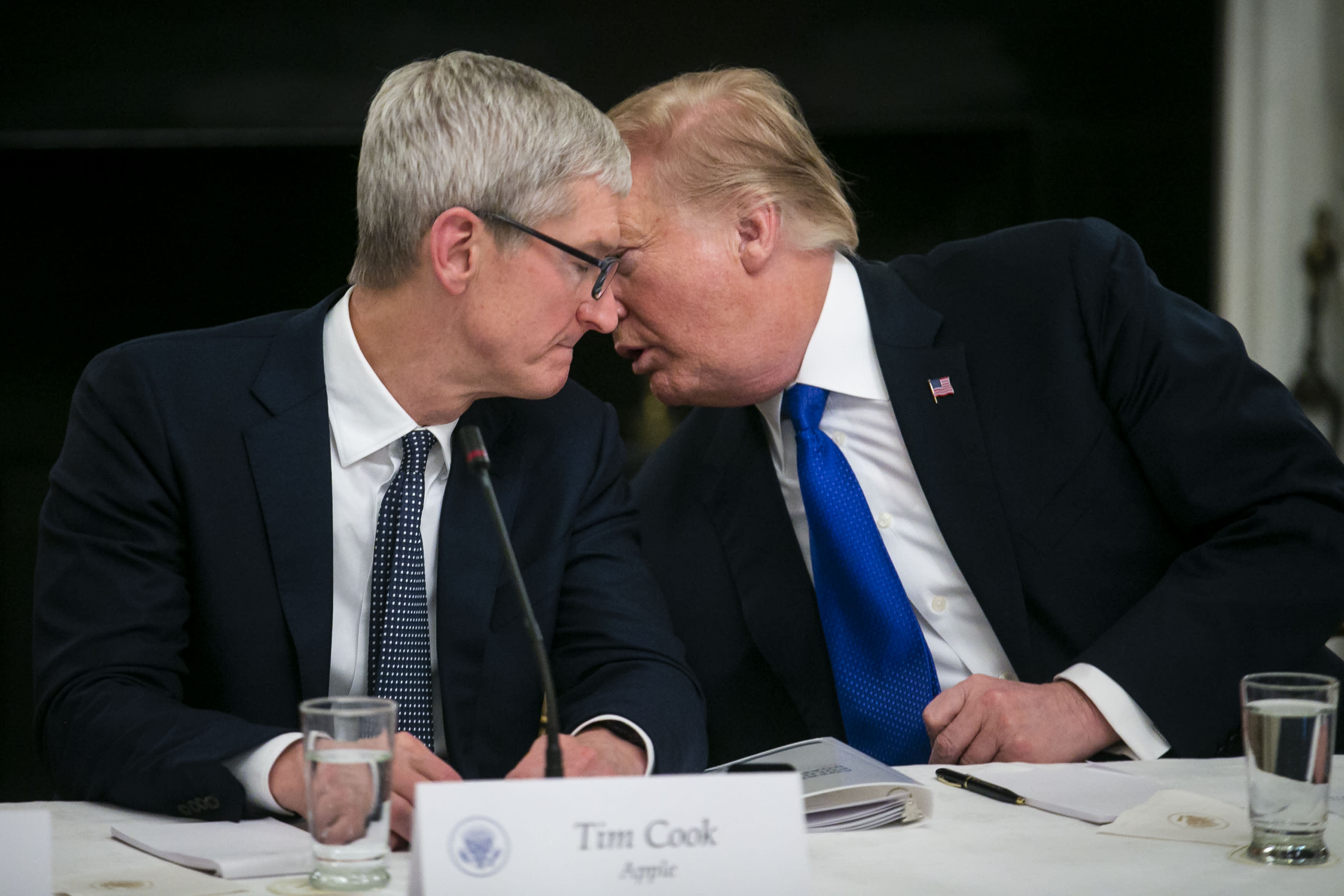U.S. President Donald Trump speaks with Tim Cook, chief executive officer of Apple Inc., during an American Workforce Policy Advisory board meeting in the State Dining Room of the White House in Washington, D.C., U.S., on Wednesday, March 6, 2019.
Al Drago | Bloomberg | Getty Images
If you need a new television, you might want to consider buying it sooner rather than later.
The U.S.-China trade war will enter into a new phase starting this Sunday that will start hitting consumers’ wallets. The Trump administration will raise tariffs on billions of dollars of imports from China starting Sunday, according to an official announcement in the Federal Register.
That means that when an electronics company imports a TV, or a smart speaker, or a drone from China starting September 1, it will have to pay a 15% tax to the U.S. government.
Eventually, this will end up raising prices on gadgets and other products for people in the United States, said Bronwyn Flores, a spokeswoman for the Consumer Tech Association (CTA), a trade group that represents 2,000 different companies in the electronics industry, including brands like Apple and LG and retailers like Walmart and Best Buy.
“You’re not likely to see price increases for consumers starting Sunday,” Flores told CNBC. “But you might start to see it in November for Black Friday, so if you want a new TV for the Super Bowl, you might want get it soon.”
“You’re going to start to see these price increases this holiday season,” she continued.
While previous batches of tariffs already in effect have affected electronics, costing the industry $10 billion since July 2018, they were mainly focused on parts and components, according to CTA. Now the tariffs are affecting more finished goods.
“List 4a,” which is what trade experts call this round of tariffs going into effect on Sunday, will place an additional import tax on smartwatches, fitness trackers, desktop computers, digital cameras and lithium batteries. That amounts to $52 billion dollars worth of consumer goods will be affected starting Sunday, according to CTA.
The poster child
Even leading American companies aren’t safe from the tariffs. Apple’s fight to keep its products unaffected by tariffs illuminates what many electronics companies are facing and how they navigate the process.
Like most electronics companies, Apple does most of its final assembly in China, leaving it vulnerable to the tariffs.
It’s important to Apple: Both AirPods and Apple Watch are likely to be hit by a 15% tariff on Sunday, and both fall under a category that is one of the fastest growing product categories at Apple. Other major products likely to be affected include the HomePod speaker and iMac desktops. Apple declined to comment.
Although the tariffs are a challenge facing all electronics makers and importers, Apple has become the “poster child” for the trade conflict, Wedbush analyst Dan Ives said in an email to CNBC. Apple stock frequently drops when President Trump tweets or makes a comment about tariffs.
“Apple has bet the farm on China with its flagship Foxconn factory and employs 1.4 million Chinese at peak through the supply chain,” Ives said. “The lifeblood of Apple’s supply chain is in China as well as much of its demand and speaks to why this trade scuffle is a $20-$25 overhang on the stock in our opinion.”
So Apple has done a lot to prevent the tariffs from affecting its products. In June, Apple said in a letter to the government that List 4 (which includes 4a and a second batch scheduled for December 15) would cover “all of Apple’s major products, including iPhone, iPad, Mac, AirPods, and Apple TV” and that “U.S. tariffs on Apple’s products would result in a reduction of Apple’s U.S. economic contribution.”
Analysts from J.P. Morgan say that Apple is more likely to absorb the cost of tariffs rather than raise the price of its products. That could cost Apple $500 million.
Apple CEO Tim Cook has also spoken directly to Trump to explain the company’s position. Trump said earlier this month that Cook made a good case and that he would “help him out short-term. “
So far, 19 Apple products currently face tariffs, according to Reuters, but none of them have seen price increases, and most of them are minor products, such as accessories like computer mice or phone cases.
On the horizon
There’s a batch of tariffs on the horizon which is poised to have an even bigger impact on the consumer electronics industry.
The list scheduled for December (List 4b) will affect $115 billion of consumer technology products, including big ticket items, according to the CTA. Categories include smartphones, laptops, tablets and video game consoles.
This batch of goods was originally scheduled to be part of the September 1 tariffs, but the USTR delayed many goods to December. Trump later said he delayed the tariffs over the Christmas shopping season, “just in case some of the tariffs would have an impact on U.S. customers.”
There is one more chance for Apple and other electronics companies to avoid a tariff: applying for an exclusion.
The US Trade Representative’s office said earlier this month that it will conduct an “exclusion process for products subject to additional tariff.”
That means that Apple and other technology companies have another chance to save their products from the tariffs. Apple is likely to apply for exemptions for its products, given that it has applied and received exemptions in the past, but the exemption process for List 4 hasn’t opened up yet, according to the CTA.
